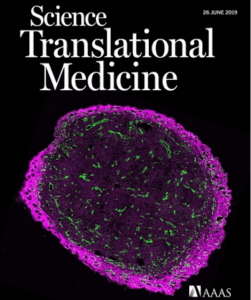 Attaching a Velcro-like molecule may prevent immune proteins called cytokines from leaking out of cancerous tissue after injection.
Attaching a Velcro-like molecule may prevent immune proteins called cytokines from leaking out of cancerous tissue after injection.
Cytokines, small proteins released by immune cells to communicate with each other, have for some time been investigated as a potential cancer treatment.
However, despite their known potency and potential for use alongside other immunotherapies, cytokines have yet to be successfully developed into an effective cancer therapy.
That is because the proteins are highly toxic to both healthy tissue and tumors alike, making them unsuitable for use in treatments administered to the entire body.
Injecting the cytokine treatment directly into the tumor itself could provide a method of confining its benefits to the tumor and sparing healthy tissue, but previous attempts to do this have resulted in the proteins leaking out of the cancerous tissue and into the body’s circulation within minutes.
Now researchers at the Koch Institute for Integrative Cancer Research at MIT have developed a technique to prevent cytokines escaping once they have been injected into the tumor, by adding a Velcro-like protein that attaches itself to the tissue.
In this way the researchers, led by Dane Wittrup, the Carbon P. Dubbs Professor in Chemical Engineering and Biological Engineering and a member of the Koch Institute, hope to limit the harm caused to healthy tissue, while prolonging the treatment’s ability to attack the tumor.


